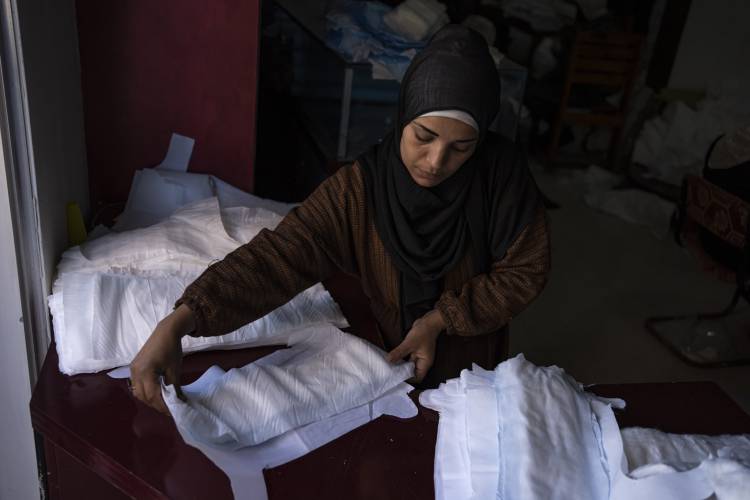Opinion: Denying Palestinian humanity, again

A Palestinian woman sews diapers in Rafah, southern Gaza Strip, Thursday, Feb. 15. Palestinians in Gaza have experienced severe shortages of basic necessities since the war began. Fatima Shbair / AP
| Published: 02-18-2024 6:00 AM |
Robert Azzi is a photographer and writer who lives in Exeter. His columns are archived at robertazzitheother.substack.com
Several weeks ago, after it became clear that Israel’s ground offensive against Palestinians in Gaza would be escalating and become a war against humanity, I had a conversation with a colleague whose opinion I respected.
In their mind, Israel, “the most moral army in the world,” was fighting a just war against an unjust and inhuman aggressor, against a people, Palestinians, described by Israeli Defense Minister Yoav Gallant as “human animals.”
So I tried to share with them an excerpt from an article authored by Sara Roy, an associate of the Center for Middle Eastern Studies at Harvard University who specializes in the Palestinian economy, Palestinian Islamism and the Israeli-Palestinian conflict, entitled ”Denying Palestinians Their Humanity: A Response to Elie Wiesel” published in Tikkun in 2014:
“There is a story I want to tell you, Mr. Wiesel, for I have carried it inside of me for many years and have only written about it once a very long time ago. I was in a refugee camp in Gaza when an Israeli army unit on foot patrol came upon a small baby perched in the sand sitting just outside the door to its home. Some soldiers approached the baby and surrounded it. Standing close together, the soldiers began shunting the child between them with their feet, mimicking a ball in a game of soccer. The baby began screaming hysterically and its mother rushed out shrieking, trying desperately to extricate her child from the soldiers’ legs and feet. After a few more seconds of ‘play,’ the soldiers stopped and walked away, leaving the terrified child to its distraught mother.”
“I don’t believe it,” my interlocutor responded, even before I finished the narration. “I don’t believe it!”
I don’t believe it, they were telling me; an Israeli would never do that.
And yet they did it. They did it because they could, as so many others, in so many other conflicts in so many places, have done.
Article continues after...
Yesterday's Most Read Articles
 Neighboring landowner objection stalls Steeplegate redevelopment approval
Neighboring landowner objection stalls Steeplegate redevelopment approval
 Lawyers and lawmakers assert the Department of Education is on the verge of violating the law
Lawyers and lawmakers assert the Department of Education is on the verge of violating the law
 Youth rally against New Hampshire’s bill allowing medical aid in dying
Youth rally against New Hampshire’s bill allowing medical aid in dying
 Body of long-missing hiker found, pinned by boulder in Dry River
Body of long-missing hiker found, pinned by boulder in Dry River
 UNH seeks vandal who accused university of genocide in spray-painted message
UNH seeks vandal who accused university of genocide in spray-painted message
 As site testing begins on new middle school site, activists file to put location debate on the ballot
As site testing begins on new middle school site, activists file to put location debate on the ballot
They did it, too, because they know that war is a terrible and imprecise weapon that, while yielding unpredictable and terrifying consequences, can also amplify voices of the intolerant, voices calling for annihilation, expulsion and revenge of peoples perceived to be unlike themselves.
They know, too, that amidst those amplifications they can defy UN resolutions and international law and conventions. They can occupy and oppress another people, exploit their resources, seize their land, and destroy their homes, mock, starve, denude, dehydrate, and dehumanize them — then bomb them.
I call that genocide.
“Thanks for going public with your antisemitic calumny,” a reader recently wrote to me. “You should know the meaning of genocide before loosely throwing it around. As a journalist, you surely know that words do matter.”
Words do matter — and I know genocide; as history, as law, by its victims, as experienced by people I know.
I know it because my first Lebanese girlfriend was an Armenian woman raised on the stories of grandparents and their children marching across the desert through Syria to refuge in Lebanon.
I know it because when we traveled together in Eastern Turkey to visit the Cathedral of the Holy Cross on Aghtamar Island in Lake Van she had to hide her Armenian identity in order not to put herself at risk (she had her European father’s surname).
I know it because I have Palestinian loved ones whose lives, for generations, have been ruled and regulated by oppressive and arbitrary authority.
I know it as Raphael Lemkin, who coined the word genocide, imagined it when he successfully lobbied for the adoption of the 1948 United Nations (UN) Convention on the Prevention and Punishment of the Crime of Genocide.
Born to Jewish parents in Poland, Lemkin decided to study law when he came to believe that the extermination of over a million Armenians were crimes against humanity and that there were no international laws or conventions against such crimes.
Lemkin defined genocide as: “Generally speaking, genocide does not necessarily mean the immediate destruction of a nation, except when accomplished by mass killings of all members of a nation. It is intended rather to signify a coordinated plan of different actions aiming at the destruction of essential foundations of the life of national groups, with the aim of annihilating the groups themselves. The objectives of such a plan would be disintegration of the political and social institutions, of culture, language, national feelings, religion, and the economic existence of national groups, and the destruction of the personal security, liberty, health, dignity, and even the lives of the individuals belonging to such groups. Genocide is directed against the national group as an entity, and the actions involved are directed against individuals, not in their individual capacity, but as members of the national group.”
Yes, dear reader, I know well what those words mean: we witness their manifestation daily.
I know it, too, that when Israeli MP Yitzhak Kroizer says in a radio interview that, “The Gaza Strip should be flattened, and for all of them there is but one sentence, and that is death” they are speaking of genocide.
This past week New York Times columnist Thomas Friedman, outdoing even defense minister Gallant, dehumanized Arabs and Muslims by comparing them to insects: “Is there a better description of Lebanon, Yemen, Syria and Iraq today? They are the caterpillars. The Islamic Revolutionary Guard Corps is the wasp. The Houthis, Hezbollah, Hamas and Kataib Hezbollah are the eggs that hatch inside the host — Lebanon, Yemen, Syria and Iraq — and eat it from the inside out.”
“We have no counter-strategy” Friedman concludes, “that safely and efficiently kills the wasp without setting fire to the whole jungle.”
A call to genocide seemingly fit to print, courtesy of the New York Times.
We must be better than that. We must be.







 Opinion: Our responsibility to care for the most vulnerable among us
Opinion: Our responsibility to care for the most vulnerable among us Opinion: New Hampshire’s LGBTQ+ Youth need support, not political attack
Opinion: New Hampshire’s LGBTQ+ Youth need support, not political attack Opinion: Seeing the full picture: Optometry can increase access to care
Opinion: Seeing the full picture: Optometry can increase access to care Opinion: Which cannabis law, New Hampshire?
Opinion: Which cannabis law, New Hampshire?
